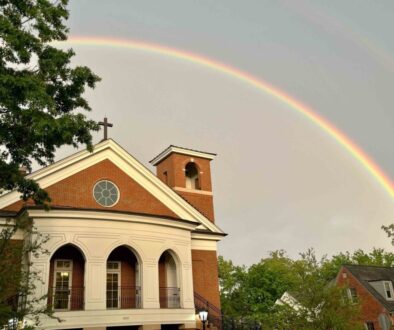Rector’s Update: June 25, 2020
Dear Restoration,
This week we finished our series on 1 John. We have been preaching through it since Easter and it has provided deep theology and rich vocabulary for what it means to know that we know the living God.
The final verse in the letter is “Little children, keep yourselves from idols.” (1 John 5: 21)
It’s an important and interesting way to wind up a book.
On the one hand, John has been saying this for 5 chapters. Don’t give your trust and worship to anything besides God: Father, Son, and Holy Spirit. We have eternal life! Christians live every moment in a relationship with God that has already begun and will continue forever. We are His children. Jesus has defeated the power and consequence of sin. The Spirit is in us.
The other way of saying this positive exhortation is the sentence he uses to close- keep yourselves from idols. At this moment in time, we are experiencing the exposure and limitations of lots of idols. I invite you to pray and listen to the Holy Spirit as He speaks to you about the idols that are active in your own life.
In case you missed the end of my sermon from Sunday, here are my reflections on the idols that are failing us in this cultural moment. I hope you will watch it again or for the first time.
On Sunday I invited you again to consider purchasing The Color of Compromise by Jemar Tisby and to reserve the evenings of July 8, 15, 22 for a 3 week conversation on racial injustice and the church. You can find the book, here, at one of our VA, independent booksellers.
Some of you have asked why am I inviting us to read this particular book and to have this particular conversation? Here are a few thoughts:
First, I want to be clear on what I am not doing. My agenda is not to heap guilt and shame on white people (like myself). Christians have been set free from guilt by the finished work of Jesus on the cross and shame never moves people in a direction for real and lasting change.
Instead of guilt and shame, it may be that God moves us to feel grief and lament. These have always been the Biblical precursors to real change and amendment of life. The good news is that God always joins us in our grief, for Jesus promised that those who mourn will be comforted (Matthew 5:4). Thus, lament is a place to meet God. I want us to meet God as we have this conversation.
Second, let me tell you about Jemar Tisby. Mr. Tisby is a Christian, black, historian, who was trained in the evangelical tradition (he has an MDiv. from Reformed Theological Seminary) that trained most of the pastors Restoration people already trust. Mr. Tisby is writing about church history from his academic work (he is a PhD candidate at the University of Mississippi) and from his lived experience as a black follower of Jesus. Unless you have read other Christian, evangelically trained, black historians, I would encourage you to read this. It will help you to understand the way many, many black people view the church’s role in bringing us to this particular moment in the summer of 2020. I am not asking you to agree with that viewpoint. I am inviting you to learn from it and to talk about it.
Third, I want to have this conversation because the direction the ‘church’ (that’s ‘church’ for any racial hue) should go from this point in time in regards to racial injustice is not at all clear. Although there have been many policy suggestions over the last few weeks that will require each of us to decide what we think about their merit, the church has not yet offered guidance for how Christians should move forward together. I would like to hear from you and to discuss with you how the church should respond- how our church should respond. In order to have that conversation, I submit that we need to know the history that got us to this conversation in 2020 and Mr. Tisby’s book is a helpful resource to engage the sins and the transgressions of the church over the last 400 years.
So, I invite you to read it. I invite you to attend all 3 Zoom conversations. I invite you to pray for the church, for our church, and for the conversation we need to have about moving forward in reconciliation, justice, and hope. I am grateful to be on this journey with you.
-David

